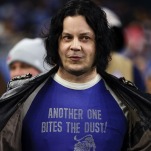Grunt author Mary Roach mines comedy out of awkwardness in 5 funny reads
With Reading List, The A.V. Club asks one of our favorite pop-culture creators to describe a list of reading materials that are tied together by a singular theme.
The reader: Mary Roach has carved out a vastly entertaining niche for herself as a chronicler of “curious” science, even though—as she told The A.V. Club in 2010—she’s “sort of a science goober.” In other words, she doesn’t come at her unconventional topics as an expert, but as someone with an open mind, a journalist’s eye for detail, and a historian’s gift for research. She also brings a comedian’s wit to her work, though some of the humor springs from the truly bizarre things she’s writing about.
Her past books include Stiff, a look at scientific experiments on cadavers; Bonk, on sex-based studies; Spook, on the science of the afterlife; and Packing For Mars, about space (“I never want to go through this again,” she said of that book’s tradition-breaking multiword, multisyllabic title.). Her latest, Grunt, deals in military science—“not the killing, but the keeping alive.” Grunt looks at how scientists are working to protect riders in armored cars, treat combat-related hearing loss, and ease the issues of war-zone dehydration and diarrhea, alongside mini-histories of the development of stink bombs and shark repellant. As always, Roach mines tremendous comic mileage from her being out of her depth amid experts, or with her deadpan descriptions of how answering logical questions required some truly bananas experiments (testing how different animals respond to different bodily fluids, menstruating women, “perhaps marveling at the strangeness of life on Earth,” were seated in front of a fan that blew their scent toward a caged polar bear). Ahead of Grunt’s release, Roach chatted with The A.V. Club about five other humorous books, ranging from ones that are close to her own style to sparse literary novels.
The A.V. Club: Before we start, was there any particular style or type of humor that led you to pick these five?
Mary Roach: I thought it’d be nice to have a combination of reported writing, straight humor, fiction, non-fiction, memoir. I wanted to look at the different approaches to humor in different genres.
AVC: You’ve said in the past that you don’t view yourself as a science writer, but do you consider yourself a “humor writer” more than a journalist?
MR: I don’t know! I guess I don’t want to consider myself a humor writer because that sets the bar high in terms of laughs per page, and often the material I’m writing about isn’t that funny. When humor works in something I like to include it—it’s fun for me and fun for the reader—but no, I don’t consider myself a humor writer, per se. I’ll say that I consider myself a non-fiction writer who is sometimes funny, so I do associate myself with humor in that way, just in case your readers aren’t familiar with my work and are wondering why the hell someone who isn’t a humor writer picked humor books.
In A Sunburned Country, Bill Bryson
MR: Like most of Bill Bryson’s books, there’s a lot of information in here, really fascinating information, so much so that even if it wasn’t funny, it’d be a really interesting non-fiction book. Of course, it’s really hilarious on top of being informative. Basically, it involves Bryson wandering around Australia, giving information about the culture and wildlife. I actually bought this book in an airport while I was on the way to Australia to report a story—what could be better than a 15-hour flight with a Bill Bryson book?—and it’s just so funny and interesting. I’ll give you an example that’s kind of tasteless: At one point he’s talking about an Australian prime minister who disappeared one day while he was at the beach, I don’t know how. Then later in the book, Bryson makes a passing reference to it as “the swim that needs no towel,” or something like that. That’s probably a terrible example, but I feel like you could open the book to any page and you’d find something funny. He gets into these situations with people he runs into, these hilarious conversations. It’s a really beautiful combination of excellent, in-depth reporting and hilarious narrative. And it’s seamlessly woven together, which is something he does in every book. He’s really an inspiration to me, because I try to weave information and reporting with humor and entertainment, but nobody does it better than him.
Dave Barry Does Japan, Dave Barry
AVC: This is actually one of my favorite books. I was mildly shocked to find another person who remembers it, let alone loves it.








![Rob Reiner's son booked for murder amid homicide investigation [Updated]](https://img.pastemagazine.com/wp-content/avuploads/2025/12/15131025/MixCollage-15-Dec-2025-01-10-PM-9121.jpg)

























![HBO teases new Euphoria, Larry David, and much more in 2026 sizzle reel [Updated]](https://img.pastemagazine.com/wp-content/avuploads/2025/12/12100344/MixCollage-12-Dec-2025-09-56-AM-9137.jpg)





